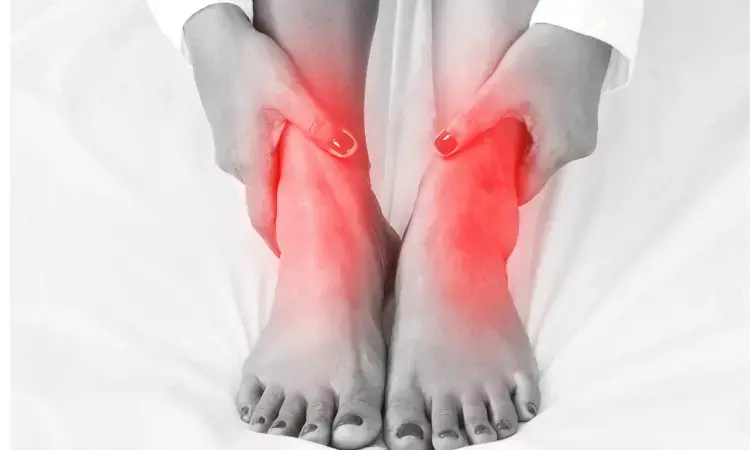- Home
- Medical news & Guidelines
- Anesthesiology
- Cardiology and CTVS
- Critical Care
- Dentistry
- Dermatology
- Diabetes and Endocrinology
- ENT
- Gastroenterology
- Medicine
- Nephrology
- Neurology
- Obstretics-Gynaecology
- Oncology
- Ophthalmology
- Orthopaedics
- Pediatrics-Neonatology
- Psychiatry
- Pulmonology
- Radiology
- Surgery
- Urology
- Laboratory Medicine
- Diet
- Nursing
- Paramedical
- Physiotherapy
- Health news
- Fact Check
- Bone Health Fact Check
- Brain Health Fact Check
- Cancer Related Fact Check
- Child Care Fact Check
- Dental and oral health fact check
- Diabetes and metabolic health fact check
- Diet and Nutrition Fact Check
- Eye and ENT Care Fact Check
- Fitness fact check
- Gut health fact check
- Heart health fact check
- Kidney health fact check
- Medical education fact check
- Men's health fact check
- Respiratory fact check
- Skin and hair care fact check
- Vaccine and Immunization fact check
- Women's health fact check
- AYUSH
- State News
- Andaman and Nicobar Islands
- Andhra Pradesh
- Arunachal Pradesh
- Assam
- Bihar
- Chandigarh
- Chattisgarh
- Dadra and Nagar Haveli
- Daman and Diu
- Delhi
- Goa
- Gujarat
- Haryana
- Himachal Pradesh
- Jammu & Kashmir
- Jharkhand
- Karnataka
- Kerala
- Ladakh
- Lakshadweep
- Madhya Pradesh
- Maharashtra
- Manipur
- Meghalaya
- Mizoram
- Nagaland
- Odisha
- Puducherry
- Punjab
- Rajasthan
- Sikkim
- Tamil Nadu
- Telangana
- Tripura
- Uttar Pradesh
- Uttrakhand
- West Bengal
- Medical Education
- Industry
AAN Guidelines on symptomatic treatment for muscle cramps

A Food and Drug Administration advisory in 2006 warned against the off-label use of quinine sulfate and its derivatives in the treatment of muscle cramps. Physicians are faced with a difficult scenario in choosing a treatment regimen for patients with muscle cramps. This American Academy of Neurology assessment systematically reviews the available evidence on the symptomatic treatment of muscle cramps.
American Academy of Neurology (AAN) has released guidelines titled Symptomatic treatment for muscle cramps in February 2010 and Reaffirmed on July 16, 2022. The guidelines have been endorsed by the American Association of Neuromuscular and Electrodiagnostic Medicine.
Following are its major recommendations:
1. Data are insufficient to support or refute the efficacy of calf stretching in reducing the frequency of muscle cramps (Level U).
2. Although likely effective (Level A), the use of quinine derivatives for treatment of cramps should be avoided for routine treatment of cramps. These agents should only be considered when cramps are very disabling, no other agents relieve symptoms, and there is careful monitoring of side effects. They should only be used after informing the patient of the potentially serious side effects.
3. Naftidrofuryl, diltiazem, and vitamin B complex may be considered for the treatment of muscle cramps (Level C).
Note:
A = Established as effective, ineffective or harmful (or established as useful/predictive or not useful/predictive) for the given condition in the specified population. (Level A rating requires at least two consistent Class I studies.)* B = Probably effective, ineffective or harmful (or probably useful/predictive or not useful/predictive) for the given condition in the specified population. (Level B rating requires at least one Class I study or two consistent Class II studies.) C = Possibly effective, ineffective or harmful (or possibly useful/ predictive or not useful/predictive) for the given condition in the specified population. (Level C rating requires at least one Class II study or two consistent Class III studies.) U = Data inadequate or conflicting; given current knowledge, treatment (test, predictor) is unproven.
Reference:
Hans D. Katzberg, Ahmir H. Khan, Yuen T. So Neurology Feb 2010, 74 (8) 691-696; DOI: 10.1212/WNL.0b013e3181d0ccca
Dr Kamal Kant Kohli-MBBS, DTCD- a chest specialist with more than 30 years of practice and a flair for writing clinical articles, Dr Kamal Kant Kohli joined Medical Dialogues as a Chief Editor of Medical News. Besides writing articles, as an editor, he proofreads and verifies all the medical content published on Medical Dialogues including those coming from journals, studies,medical conferences,guidelines etc. Email: drkohli@medicaldialogues.in. Contact no. 011-43720751


